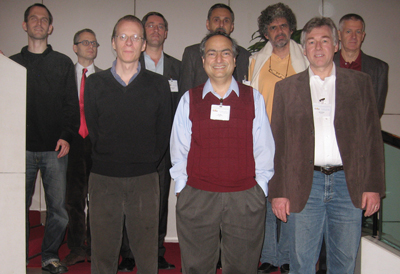by Dimitris Plexousakis
The ERCIM-led Future and Emerging Technologies (FET) Coordination Action Interlink (International Cooperation Activities in Future and Emerging ICTs) held its consolidation workshop in Cannes, France on 12-14 November.
Interlink is a two-and-a-half year endeavour aimed at identifying new challenges for basic research in three areas of strategic importance, namely Software-Intensive Systems and New Computing Paradigms, Ambient Computing and Communication Environments, and Intelligent and Cognitive Systems. The workshop brought together all three working groups with the goal of finalizing proposals on strategic research directions, related disciplines and fundamental problems that need to be addressed within the selected areas.
The first day of the workshop began with an overview of the aims and structure of the workshop by Dimitris Plexousakis, FORTH. This was followed by a presentation by Interlink's project officer, Walter van de Velde from the European Commission (EC), on the collaborative research opportunities arising within the programme of the FET unit of the EC in forthcoming years. The workshop also featured a number of invited talks. Joseph Sifakis (CNRS Grenoble, ACM Turing Award 2007 recipient) delivered the keynote address on the verification of complex software systems. The coordinators of the three thematic areas gave an overview of their respective research areas and group proposals, setting the context for the Thematic Group invited talks. Stefan Jaehnichen (Fraunhofer Gesellschaft) talked about challenges arising in grid computing and computing clouds. Ted Selker (MIT Media Lab) presented his research and ideas on context-aware computing and Henrik Christensen (Georgia Tech) elaborated on the study of artificial cognitive systems.

For the second day of the workshop, the three groups worked in parallel with the aim of identifying major challenges where significant added value is expected to be gained from worldwide cooperation. The groups also deliberated on the scientific, technological and societal impact of the research proposals as well as on knowledge-building mechanisms, research practices, innovation mechanisms and programmes for sustainable cooperation. On the third day, representatives of the Working Groups and the scientific steering committee discussed cross-thematic challenges arising at the intersections of the thematic areas. The group identified the vision of 'smart cities' (multiscale smart spaces) as a unifying research theme in which major challenges relating to the individual areas arise most prominently. The workshop concluded with presentations of the research proposals of the Working Groups as well as of the cross-thematic challenges.
Links:
http://www.ercim.org/interlinkworkshops/
http://interlink.ics.forth.gr/
Please contact:
Dimitris Plexousakis
ICS-FORTH, Greece
E-mail: dp![]() ics.forth.gr
ics.forth.gr









